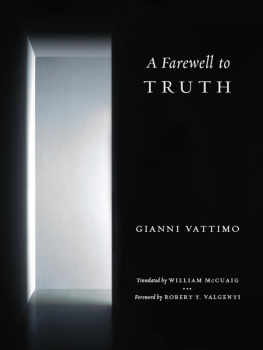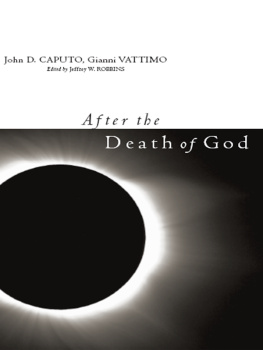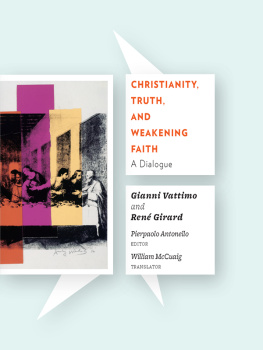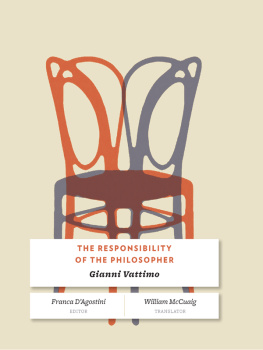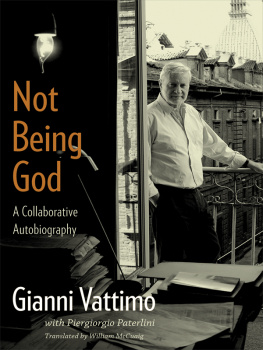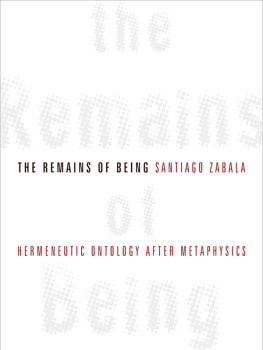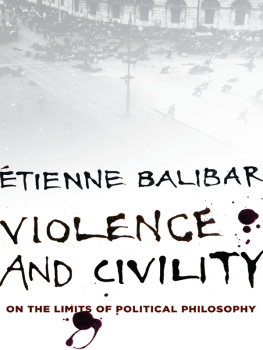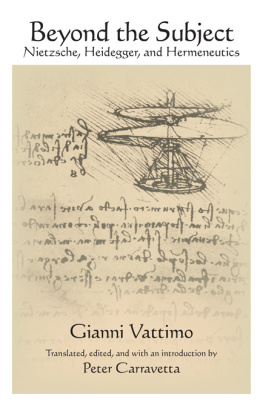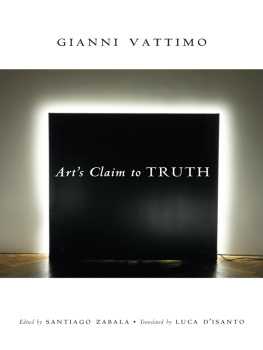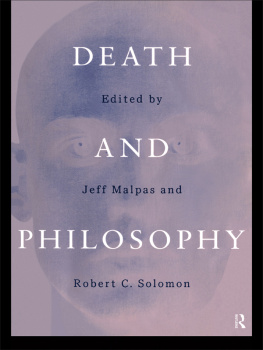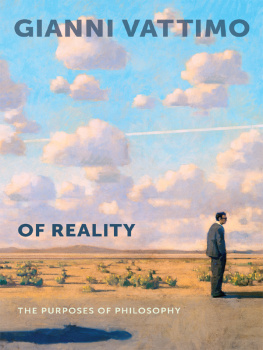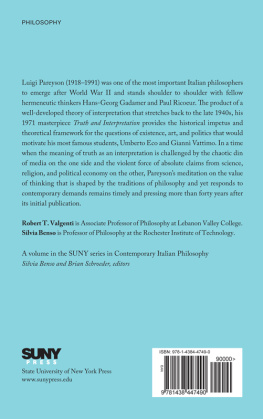A FAREWELL TO TRUTH
A Farewell to TRUTH
G I A N N I V A T T I M O
Translated by WILLIAM McCUAlG
Foreword by ROBERT T. VALGENTI
Columbia University Press NEW YORK
COLUMBIA UNIVERSITY PRESS
Publishers Since 1893
NEW YORK CHICHESTER, WEST SUSSEX
cup.columbia.edu
Originally published in Italian as Addio alla verit, copyright 2009 Meltemi Editore
Translation copyright 2011 Columbia University Press
All rights reserved
E-ISBN 978-0-231-52755-2
Library of Congress Cataloging-in-Publication Data
Vattimo, Gianni, 1936
[Addio alla verit. English]
A farewell to truth / Gianni Vattimo ; foreword by Robert T. Valgenti; translated by William McCuaig.
p. cm.
Includes bibliographical references (p. ).
ISBN 978-0-231-15308-9 (cloth : alk. paper)ISBN 978-0-231-52755-2 (e-book)
1. Truth. I. Title.
B3654.V383A3313 2011
195dc22
2010032008
A Columbia University Press E-book.
CUP would be pleased to hear about your reading experience with this e-book at .
CONTENTS
Robert T. Valgenti
GIANNI VATTIMO IS one of those rare thinkers in whom thought and action suffer little separation. From his early political activism to his two terms as a member of the European Parliament, he has transformed nihilism into a vocation on behalf of the causes of democracy, cultural pluralism, and human solidarity. For philosophers and politicians alike, however, the title Farewell to Truth risks sounding more like a punch line than a manifesto for political liberation. While the fear might be that such a pronouncement could be mistaken for the expediency of political lies, the more disturbing reality is that all too often in the age of sound bites, twenty-four-hour news cycles, and dwindling attention spans, the invocation of absolutesreligious, natural, economichas emerged as a common and effective call to arms in the face of an increasingly pluralistic, global society. Paradoxically, the bearers of these absolutes do not simply reject the common idiom of interpretation that Vattimo indicates elsewhere as symptomatic of postmodern Western culture; rather, they are strangely enabled and nourished by it. Having accepted on principle the reality of a relativistic world where there seem to be no facts, only interpretations, they extol the practicality and utility of direct action in the service of an absolute. In such a climate, Vattimos farewell to truth is not a woeful resignation but a timely call to extinguish the final flashes of metaphysics and resist the belief that only absolute action and sovereign decision can guarantee peaceful coexistence.
Farewell to Truth is not a flat-out rejection of truth per se but the recognition that truth is something we construct. It is therefore not a descriptive claim about the world as it really is, but in a manner similar to Nietzsches announcement that God is dead, the farewell to truth is an interpretation that marks the commencement, and the very basis, of democracy (xxxiv) as an epochal truth that is constructed with consensus and respect for the liberty of everyone (xxxvi). Democracy is not a truth that must be grounded or deduced but is instead a historical inheritance and political reality to which one must respond, either dogmatically or pluralistically. As a hermeneutic thinker and politician, the challenge for Vattimo has been to articulate a call for human liberation that accepts the interpretative character of truth while not taking its own position as absolute. The validity of Vattimos position is often criticized as an irresolvable dilemma: either his philosophical commitments are politically expedient and thus merely rationalizations of leftist ideology, or those same commitments are based on a descriptive, and hence unavoidably metaphysical, claim about reality. Yet a resolution emerges within the development of his ontology of actuality and the transformation of philosophy into an ethics of interpretation.
Vattimos initial decision to study philosophy was largely a consequence of [his] religious commitment and [his] militant political attitude, Nonetheless, Pareyson looked skeptically upon his pupils direct involvement with the religious and political movements of the day: due to its ontological character, philosophy was already and necessarily intertwined with all human activities, politics included.
This attitude is most pronounced in Pareysons theoretical masterpiece, Verit e interpretazione (1971). Throughout the mid-1960s, Vattimo worked closely with his mentor on the lectures that form the theoretical core of Pareysons hermeneutic ontology. The title of Pareysons 1964 autumn lecture, Expressive Thought and Revelatory Thought, represents the idea that thinking is itself a thinking of Being in both the objective and the subjective sense, whereby revelatory thought is able to interpret Being as a new opening of truth, while expressive thought is merely able to articulate particular truths from within an already established aperture. Tragic thought requires an unquestioning reverence for an ontological origin that is wholly other and inexhaustible. Vattimos revisioninspired by his Nietzschean reading of Heideggerbrings this very origin into the flux of history and prepares the way for an ontology of actuality that takes up the present moment as an origin to be emancipated from the essentialisms of metaphysics.
Understood as a way to dissolve philosophy into ethics and consume the theoretical experience of metaphysics, the ontology of actuality carries a twofold significance. making oneself aware of the paradigm into which one has been thrown yet suspending its claim to definitive validity and heeding Being as that which remains unsaid (32). One reconstructs the sites of ontology in the present while resisting the temptation to consider the self-consumption of truth in solidarity [as] an objective description of our situation (134). Here one finds an alternative to the purported dilemma facing Vattimos hermeneutics: its origin is neither metaphysical, since it resists any claim to ultimate validity or description, nor purely political, since its motivation is precisely the critique and rejection of simple will to power based on an ideal of charity. The alternative to the seemingly irresolvable dilemma between philosophy and politics is their dissolution into a way of thinking and acting that takes truth as a project for humanity rather than as its ultimate criterion.
The linchpin that unifies this double critique is Being, or more precisely, the ontological difference as a historical inheritance whose origin is present to us only through an interpretation in the here and now. There is no ultimate appeal to Being as the ineffable source of reality; rather, for Vattimo we are always already underway and thrown into a historical context. Thus, the truth of human freedom is not originary as it was for Pareyson (Being is the originary choice for existence, as spelled out in his emblematic Ontology of Freedom) but is something we construct through the remembering of ontological differencewhat Vattimo often refers to as the andenkend thought of Heidegger, which has no origin placed somewhere outside of the actuality of the event (42). Pareysons metaphysical insistence on the originary choice for Being and trutha for or against alternativerepresents a species of ontological blackmail no longer tenable if one accepts the end of metaphysics. The ontology of actuality willingly lets go of this final metaphysical limitation and accepts plurality and community, rather than originary conflict, as the trace of Being.

